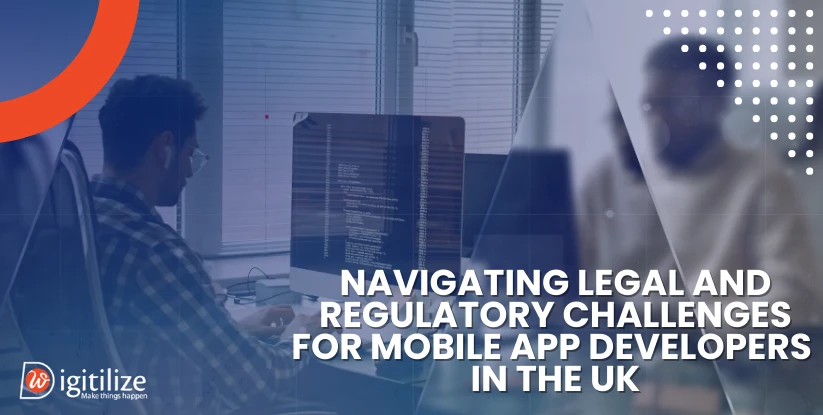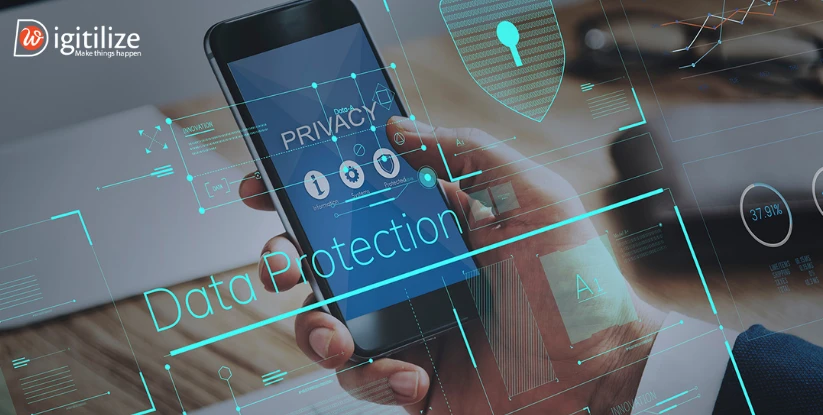Navigating Legal and Regulatory Challenges for Mobile App Developers in the UK
 The ever-evolving field of software and app development is expanding at an astounding rate. Nonetheless, navigating legal and regulatory challenges for mobile app developers in the UK is necessary in light of this innovation. It’s evident that there is a sizable market, and there may be advantages to pursuing your concept if you have one. Before you start writing code, you should be aware of a few legal factors that could affect your app. Learn more by continuing to read!
The ever-evolving field of software and app development is expanding at an astounding rate. Nonetheless, navigating legal and regulatory challenges for mobile app developers in the UK is necessary in light of this innovation. It’s evident that there is a sizable market, and there may be advantages to pursuing your concept if you have one. Before you start writing code, you should be aware of a few legal factors that could affect your app. Learn more by continuing to read!
Understand the navigating Legal and Regulations for Mobile App Developers in the UK
To guarantee user safety, data privacy, and ethical conduct, developers of apps must abide by several legal and regulatory regulations. Serious repercussions follow non-compliance, including harm to one’s reputation, fines, and erosion of user confidence. Following all legal and regulatory regulations is important for the following reasons:
-
Contracts That Are Enforced Worldwide
Many apps today are used in different countries. If your app goes beyond the UK, your contracts must reflect that. Standard UK app development regulations are not enough.
To protect your business, use globally enforceable contracts. These contracts should include terms that work across borders. One key part is the international arbitration clause. This clause makes your contract valid and enforceable in other countries too.
Without it, you may face legal trouble abroad. You’ll need to follow foreign laws and check which court has authority. That takes time and money.
So, work with legal experts and update all contracts. This step helps you avoid legal gaps and keeps your app safe worldwide.
-
Mobile Application Confidentiality
Confidentiality preservation is an additional component of app protection. It’s crucial to take preventative measures since you don’t want confidential information about your business to leak and perhaps be used against you. Non-disclosure agreements (NDAs), confidentiality provisions, and non-compete agreements are always options for protecting inside knowledge. This way, you can make sure that confidential information is kept safe, and since it’s written in a contract, you may enforce it in court if necessary.
Liability is the legal obligation a company has to every one of its customers. Comparing app development to other corporate endeavors, it is often a lower-risk endeavor.
But since it’s an internet program, there are security issues related to cyberspace. Consider scams and data breaches! Thus, it is your responsibility as an app developer to take precautions to reduce your exposure to these kinds of hazards. Exclusion clauses and several other forms of liability releases may address liabilities. Moreover, depending on how these terms are written, your obligation may be limited or excluded.
-
Keeping the IP of Your Mobile App Safe

Your business likely depends on intellectual property (IP). This includes anything you create, like slogans, logos, names, or even unique app features. These are valuable assets that need protection.
If your mobile app contains IP, don’t leave it exposed. Protect it from copycats and unauthorized use. The best way is to register your IP.
You can apply for trademarks or patents through the Intellectual Property Office (IPO). These give you legal rights over your app’s unique elements. For things you can’t register—like business ideas or internal methods, use legal contracts.
Add non-disclosure agreements (NDAs) and confidentiality clauses in every vendor or employee contract. This stops others from leaking or misusing your app’s IP.
In 2025, IP theft is common in tech. So, don’t skip this step. Secure your IP before launching your app.
Developing an app may require interacting with outside parties. Hiring staff members, contractors, or vendors may be necessary for this. Getting assistance is wonderful and frequently advantageous, but business partnerships should always be formed under contract. That way, you have a legally enforceable document to refer to in the event of a disagreement and everyone is on the same page.
Before utilizing any of the several app-selling sites, you must abide by their respective terms of service. Before you sign up to use an app, it’s crucial to check if it complies with all the rules on their agreements (like the Apple Store or Google Play). Hence, these sorts of paperwork might include a lot of information, so don’t be afraid to ask a lawyer for assistance if you need it!
-
Conditions and Terms for Mobile Apps
It is important to have UK app market regulations to control user behavior and how they interact with your app. Users must accept the terms outlined in your terms and conditions before they can use your app. This might entail creating an account or revealing their age before participation. So, limiting responsibility for any issues that arise when customers use your software is another purpose for it. Consequently, you have the right to enforce the agreement and, if necessary, take legal action if a user ever violates these conditions.
Challenges of Legal and Regulatory for Mobile App Developers in the UK

-
The intricacy of regulations
Businesses today must follow strict data laws like CCPA, GDPR, and HIPAA. These rules keep changing and can be hard to understand. But companies can’t afford to ignore them.
Take healthcare, for example. A mobile app developer working with patient data must follow HIPAA guidelines. These rules protect personal health information. If the company fails to follow them, it could face heavy fines and lose trust.
With 5G enabling faster data transfers, the risk is even higher. More speed means more data—and more responsibility. Every business must stay alert and ensure compliance at every step.
-
Interjurisdictional Cooperation
Running a global e-commerce app means dealing with many regulations. Each country has its own data protection laws. Your company must follow these rules to stay compliant.
Balancing different legal duties is not easy. But ignoring them can lead to fines or loss of customer trust. If your app serves users worldwide, you must build privacy features into the system.
Make sure the app meets GDPR in Europe, CCPA in California, and similar laws in other regions. Always collect, store, and process user data based on local rules. This step is key to earning global customer confidence.
-
Security & Privacy of Data
User data protection is very important, yet it can be difficult. To stop unwanted access or security breaches, a developer has to put strong security mechanisms, encryption techniques, and safe data storage in place.
Example: To protect consumers’ financial information and stop identity theft, banking app developers have to abide by strict data privacy standards.
Companies often hire outside vendors for app development services. But trusting a third party means more risk. You must ensure your vendor follows all data privacy laws. In 2025, regulations have become stricter, especially for mobile apps handling payments or personal data.
Retail app developers need to take extra care. When using cloud service providers, they must check if the provider meets all key compliance standards. One major rule is PCI DSS, which protects card payments. If your app handles online transactions, this is non-negotiable.
It can be difficult to ensure that applications are usable by all users, including those who have impairments. WCAG and other accessibility guidelines must be followed by developers to guarantee inclusion.
Apps need to adjust to new needs when laws and regulatory challenges for app developers. Sustaining constant compliance requires constant work.
-
Testing and Assurance of Quality
Thorough testing is necessary to guarantee the compliance of an app licensing. App developers need to make sure that their creations adhere to both functional specifications and legal restrictions. Also navigating legal and regulatory challenges for mobile app developers in the UK.
Failure to comply with regulations may result in harsh penalties and reputational harm, all of which may be harmful to the growth of an app.
Final thought
One of the most important tasks for developers is navigating legal and regulatory challenges for mobile app developers in the UK.
Maintaining compliance calls for continual oversight and frequent audits, as it is not a one-time event. By using efficient compliance management techniques and adhering to best practices, developers may negotiate the complexity and reduce any hazards. Hence, contact seasoned developers who put legal and regulatory compliance first to make sure the app compliance strategies with all norms and requirements by getting in contact with mobile app development services.
Therefore, contact DigitilizeWeb
to make compliance your driving concept and create apps that both satisfy user demands and adhere to the constantly shifting regulatory landscape.
Frequently Asked Questions
In order to guarantee that software applications fulfill legal and quality criteria, regulatory compliance in software refers to abiding by certain guidelines, standards, and regulations established by authorities or trade associations.
In order to guarantee the safety, effectiveness, and quality of pharmaceutical goods, regulatory compliance in the pharmaceutical sector means abiding by stringent rules and regulations. This covers labeling specifications, Good Manufacturing Practices (GMP), and other things.
Regulation and compliance differ primarily in that the former pertains to adhering to set regulations or standards. Regulation, on the other hand, is the process of establishing and upholding such guidelines. Compliance refers to abiding by the rules.
Reskinning applications is essentially the act of altering an app's front picture. It is quite legal to do this, and you can actually use a lot of different apps to accomplish this. Hence, to avoid violating any copyright laws, it's crucial to confirm that all of the images being remastered have authorization to be used.
 The ever-evolving field of software and app development is expanding at an astounding rate. Nonetheless, navigating legal and regulatory challenges for mobile app developers in the UK is necessary in light of this innovation. It’s evident that there is a sizable market, and there may be advantages to pursuing your concept if you have one. Before you start writing code, you should be aware of a few legal factors that could affect your app. Learn more by continuing to read!
The ever-evolving field of software and app development is expanding at an astounding rate. Nonetheless, navigating legal and regulatory challenges for mobile app developers in the UK is necessary in light of this innovation. It’s evident that there is a sizable market, and there may be advantages to pursuing your concept if you have one. Before you start writing code, you should be aware of a few legal factors that could affect your app. Learn more by continuing to read!



